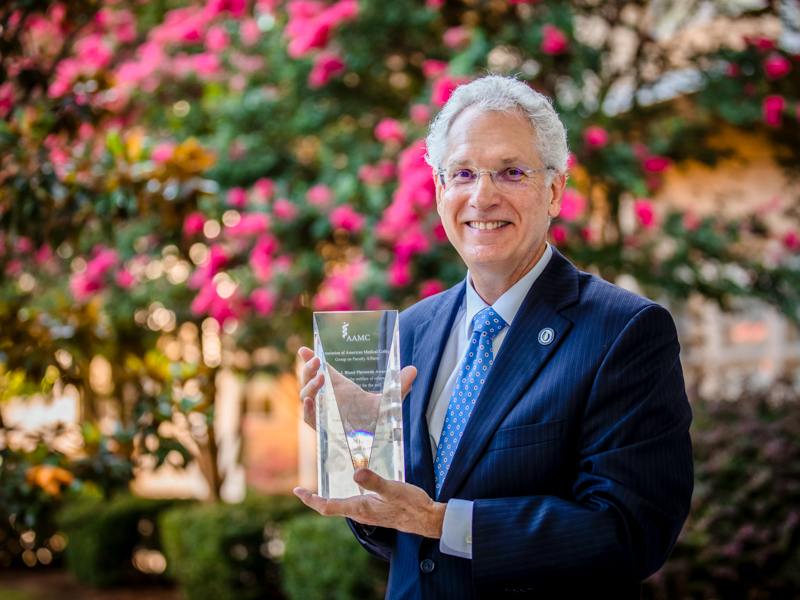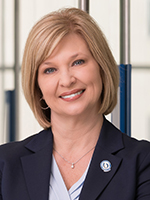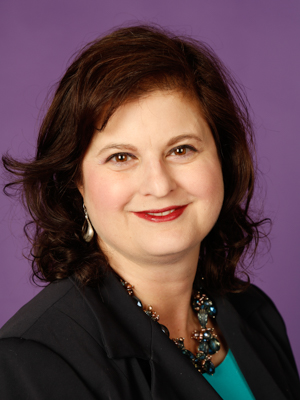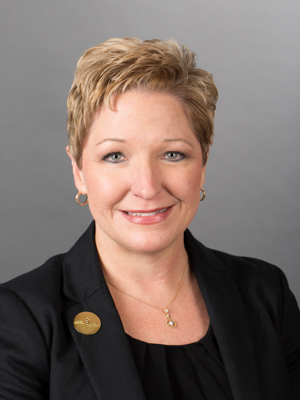Phronesis Award recognizes SOM assoc. dean's faculty support

When listing the many reasons Dr. Patrick Smith became a psychologist, let’s not forget the cigarettes.
Tobacco use, that is – not by him, but by smokers in a research study when Smith was still an undergraduate student.
Observing people jog and people drink (but not the same people) also did much to instigate the career of Smith, who today is the chief faculty affairs officer and School of Medicine associate dean of faculty affairs at the University of Mississippi Medical Center.
Without those early experiences, perhaps, he would not be where he is today, producing a body of work that has earned him the supreme honor in his line, which, in short-hand, is to support faculty who serve and lead the Medical Center.
“I learn something new and different almost every day,” said Smith, the recent recipient of the Carole J. Bland Phronesis Award presented by the Group on Faculty Affairs of the Association of American Medical Colleges.
Others who have received the award excelled at such places as the Chicago Medical School, Duke University School of Medicine and Mayo Medical School. To quote the AAMC, it is reserved for “members of the faculty affairs community who exemplify the spirt of phronesis through dedicated and selfless promotion of faculty quality.”
That’s an assignment that, for Smith, is “rarely mundane.”
The day-to-day surprises are what he likes most about what he does, and what he has been doing for years at UMMC – as advisor, researcher, administrator, leader and, in a role described by the most influential person in his career: Dr. Kevin Grigsby, now a senior director at AAMC.
The term, which sounds more suited to a herpetologist, is “toxic handler.”
The toxins he handles aren’t poisons afflicting the human body, but rather “disturbances” in the vast organism that is an academic medical center, Smith said. His job is to handle those turbulences by finding ways to head them off before they happen again.
“They are mostly unintentional,” said Smith, who also has a faculty appointment as a professor of family medicine.
Here’s one example of an unintentional disturber, he said: A clinical provider who, meaning well, allows a staffer to leave work early to take care of personal business. If that staffer is a nurse whose nurse manager wasn’t consulted first, then nursing care in that clinic could be diminished, and patient safety may suffer.
That type of scenario led to one of Smith’s handiworks: the University Professionalism Collaborative, an effort to raise awareness about the ways disturbances arise.
“If you make people aware, that often leads to a change in their behavior,” Smith said. “So, my work is really that of an academic administrator. Even though I have a degree in psychology, I haven’t practiced psychology in about six years.”
Even so, Smith is the first psychologist in his family, although his father, Burris Olen Smith, might disagree.
In Winston County, where Smith grew up with his sister in the town of Louisville, their mom, Maxine Pearson Smith, owned and operated a women’s clothing store, The Duck Shop, named for the original owner, Mrs. Duck. Their dad was a lawyer and had served in the Army National Guard for about three decades before retiring as a major general.
“When I was an undergraduate at Millsaps College, my dad asked me what I was going to do,” Smith said. “I told him I was going to graduate school to study psychology, the science of human behavior. And he said, ‘Well, hell, I’ve learned that.’
“My dad’s view was that, after overseeing thousands of troops over his military career, he had the equivalent of a psychology degree.”
By contrast, Smith didn’t have to join the Army and it took him only about eight years to earn his master’s degree and PhD – which he never knew he wanted until a chance meeting years earlier.
“My neighbor was doing tobacco research with a psychologist at UMMC,” Smith said. “Listening to him talk about his work got me interested, so I volunteered to help.”
This new-found attraction to research never faded, not even when it forced Smith to put on his running shoes and sweat. That was what happened after he enrolled the following fall at Millsaps; during his college days, he worked for three-plus years with research psychologists at UMMC on what he calls “Scientific Jogging.”
“I jogged with the research subjects,” he said.
Around that time, he also dove into alcohol – researching recovery programs that featured Antabuse, a drug to treat alcohol use disorder. He was also part of an effort to teach alcoholics how to drink socially without becoming intoxicated.
Both these projects were conducted at the Veterans Affairs Medical Center in Jackson and marked the beginning of Smith’s long association with that institution. By 1983, though, he was in Oxford at the University of Mississippi, pursuing advanced degrees in psychology and, as it turned out, his future wife.
They met in 1985 and were married at the end of that year. This year, Smith honored her in his acceptance speech for the AAMC award: “My deepest gratitude goes to my wife and life partner of 35 years, Tessie. She has simply made me better and I continue to be a work in progress.”
Tessie Smith is the reason the couple returned to Jackson about two years after their wedding. When she was offered at job at the Department of Mental Health, Smith persuaded the Ole Miss faculty to let him finish his psychology training and residency at UMMC – which he did by 1991.
Then the VA came calling again.
For four years, Smith worked there before embarking on a journey of several yards to join UMMC next door. Within seven years, he was a full professor in the Department of Family Medicine.
After another seven years, in 2009, he was asked by the Medical Center’s future leader, Dr. LouAnn Woodward, to create something never seen here before. “It was the Office of Faculty Affairs for the School of Medicine,” Smith said.
As the newly-minted associate dean for that office, Smith, along with his colleagues, did so well that Woodward, who is vice chancellor for health affairs and dean of the School of Medicine, made another request: Support the faculty in every school on campus, not just one.
Smith has been doing that since 2014 as chief faculty affairs officer in a role that can directly affect up to 1,000-plus souls; that’s how many people serve in faculty roles at the Medical Center. Whether they know it, many of them have been touched by the group that Smith leads.
Over the years, he has done everything from writing by hand congratulations cards for those who have been promoted, to helping shorten patients’ wait times through the use of a stopwatch.
His resume of successes led to the Phronesis tribute.

“My sincere congratulations go to Patrick for this very well-deserved award,” said Woodward, who serves on the board of the AAMC.
“For seven years now, he has been creative and diligent in his efforts to support the faculty of all our campus schools and I am proud that he has been recognized with the top honor in his field. I hope others will join me in letting Patrick know how grateful we are for his work on behalf of the Medical Center.”
The nomination for that honor came from a group of faculty affairs professionals, and it was Dr. Wendy Ward who wrote the letter summarizing their thoughts.

“It was an honor and a privilege to do so for someone who has touched so many lives,” said Ward, professor and associate provost for faculty at the University of Arkansas for Medical Sciences. She has also been Smith’s protégé.
“He is the go-to mentor for many, many people in this field,” Ward said. “He helps grow the strengths of emerging leaders so well. And I put myself in that group. The work he does, service for the faculty, is important for many reasons, beyond the fact that it’s the right thing to do.”
Among those reasons, she said, is that it helps reduce faculty attrition, promotes their careers, and fosters wellness – a critical need, especially during the pandemic’s stresses.
“Dr. Smith has a peaceful, calming presence that affects you and helps you approach a problem calmly yourself,” Ward said. “We all think the world of him.”
As does Kathy Pipitone, who has been working with Smith for 12 years, taking on projects with him. One of the most important assignments for the Office of Faculty Affairs, she said, was the Medical Center’s leadership recruiting program; it didn’t exist until the office created it and, in so doing, developed a list of qualities and skills this institution looks for when searching for new leaders.

“Other places across the country have mirrored that process,” said Pipitone, faculty affairs director at UMMC.
“Faculty are so important in keeping the Medical Center functioning well, and so I’m very proud that Dr. Smith has won this award. He is someone who always wants to bring out the best in others.
“If we are constantly trying to find out what the faculty need and what we can do so they can be the best they can be, learning what worked well, or what didn’t and how to make that better – if we can do all that, then I believe we’ve done our jobs well.”
For his part, Smith finds his work to be “inspiring,” he said.
“It’s getting to see people be successful, seeing the impact our faculty has. It’s amazing to see what these people do. That’s the fun thing for me.”


